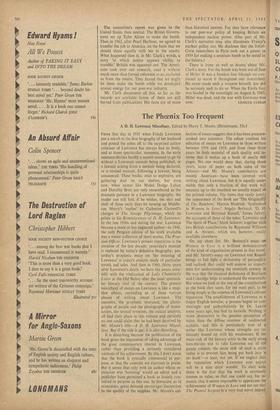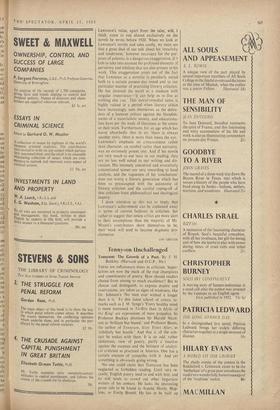The Phoenix Too Frequent
A D. H. Lawrence Miscellany. Edited by Harry T. Moore. (Heinemann, 35s.)
FROM that day in 1931 when Frieda Lawrence put a match to the first biography of her husband and posted the ashes off to the surprised author criticism of Lawrence has always had its lively, and at times spectacular, moments. In the early nineteen-thirties hardly a month seemed to go by without a Lawrence memoir being published, or a lawsuit arising from a memoir being declared, or a revised memoir, following a lawsuit, being announced. These books, once so explosive, are gathering dust on our shelves, but even now, when names like Mabel Dodge Luhan and Dorothy Brett are only remembered as the dramatis persona: in a Lawrence biography, the reader can still feel, if he wishes, the shot and shell of those early days by turning up Middle- ton Murry's 'replies' to Catherine Carswell's charges in The Savage Pilgrimage, which he prints in his Reminiscences of D. H. Lawrence. In the late 1930s and during the war, Lawrence became a more or less neglected author—in 1946, the only Penguin edition of his work available was a minor collection of short stories, The Prus- sian Officer. Lawrence's present reputation is the creation of the last decade; yesterday's memoir is replaced by today's definitive biography; yes- terday's prophetic essay on 'the meaning of Lawrence' is today's analytic study of particular novels and tales. And then in 1960, thirty years after Lawrence's death, we have the alums mira- bilis with the vindication of Lady Chatterley's Lover at the Old Bailey after the most spectacu- lar literary trial of the century. The present miscellany of essays on Lawrence is like a snap- shot album, reminding us of these various phases of writing about Lawrence. The memoirs, the prophetic utterance,' the photo- graphs of people and the photographs of manu- scripts, the textual revisions, the critical analysis, all find their place in this volume and certainly no one could claim that he had been deceived by Mr. Moore's title—A D. IL Lawrence Miscel- lany. But if the title is apt, it is also disturbing.
It is disturbing because the publication of the book gives the impression of taking advantage of the great contemporary interest in Lawrence, rather than providing a seriously considered estimate of his achievement. By this I don't mean that the book is cynically commercial in pur- pose, or that the contents are exercises in praise. But it seems that only with an author whose re- putation was 'booming' would an editor and a publisher have permitted a book as loosely con- ceived in purpose as this one. In literature, as in economics, great demand encourages inattention to the quality of the supplies. Mr. Moore's col- lection of essays suggests that it has been pressure- cooked into existence. The editor confines his selection of essays on Lawrence to those written between 1956 and 1959, and from these three years he finds material of such quality and in- terest that it makes up a book of nearly 400 pages. No one would deny that, during those years, acres of paper on both sides of the Atlantic—and Mr. Moore's contributors are mainly American—have been covered with writing about Lawrence, but it is equally unde- niable that only a fraction of that work will measure up to the standard we usually expect of the printed volume. The items that really justify the appearance of the book are 'The Originality of The Rainbow,' Marvin Mudrick; 'Symbolism in Women in Love,' Angelo Bertocci; `D. H. s
Lawrence and Bertrand Russell,' James Jarrett; the accounts of three of the tales; !Lawrence and The Spirit of Place,' Mark Schorer; together with two British contributions by Raymond Williams and A. Alvarez, which are, however, easily available elsewhere.
On my short list, Mr. Bertocci's essay on Women in Love is a brilliant demonstration
of the kind of organisation present in that novel,
and Mr. Jarrett's essay on Lawrence and Russell brings to full light a dichotomy of personality and outlook that could well assume an import- ance for understanding the twentieth century in the way that the classical dichotomy of Bentham and Coleridge helps to understand the nineteenth. But when we look at the rest of the contributions in the book they seem, for the most part, to he living simply at the expense of Lawrence's current reputation. The establishment of Lawrence as a major English novelist, a process begun so con- vincingly and authoritatively by Dr. Leavis some years ago, has had its hazards. Nothing is more obstructive to the genuine perception of value than the diffuse murmur of undirected acclaim, and this is particularly true of a writer like Lawrence whose strengths are in- timately bound up with his weaknesses. If the main task of the literary critic in the early ninel, 4, teen-thirties was to take Lawrence out of the gossip column, the main task of such a critic today is to prevent him being put back into 'a set book'—at least, not yet. If we neglect this, the reputation which Lawrence now enjoys will be a nine days' wonder. To start with, there is the fact that his work is extremely uneven in value, so that one could say, for in- stance, that it seems impossible to appreciate the achievement of Women in Love and not see that The Plumed Serpent is a very bad novel indeed.
Lawrence's value, apart from the tales, will, I think, come to rest almost exclusively on the novels he wrote before 1920. When we look at Lawrence's novels and tales coolly, we must see that a great deal of our talk about his 'creativity and tenderness,' however necessary for the pur- poses of polemic, is a dangerous exaggeration, if it fails to take into account the profound elements of perversity and nihilism that are also present in his worlc. This exaggeration arises out of the fact that Lawrence as a novelist is peculiarly suited both to a certain present-day mood and to our particular manner of practising literary criticism. He has invested the novel as a medium with singular importance-t-lt can help us to live as nothing else can.' This moral-remedial stress is highly valued in a period when literary critics have increasingly seen themselves as the defen- ders of a humane culture against the blandish- ments of a materialistic society, and educationa- lists have put the study of literature at the centre ot their work. Furthermore, for an age which has learnt absorbedly that in art 'there is always another story, there is more than meets the eye,' Lawrence's emphasis on consciousness rather than character, on symbol rather than narrative, was an extremely potent one. And if his novels are very much to our taste in our reading, they are no less well suited to our writing and dis- cussion. His intensely conceived and evocatively concentrated soenes.are very rewarding to local analysis, and the vagueness of his 'conclusions' does not worry a literary generation which has been so preoccupied with the autonomy of literary criticism and the careful roping-oft of that criticism from philosophical and theological inquiry.
I draw attention to this not to imply that Lawrence's achievement can be explained away it terms of current fashions in criticism, but rather to suggest that unless critics are more alert to their assumptions than the majority of Mr. Moore's contributors show themselves to be, their work will tend to become dogmatic pro- clamation
IAN GREGOR















































 Previous page
Previous page